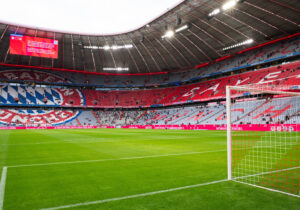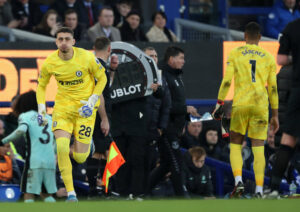An extraordinary free kick specialist who lit up Serie A and La Liga. A player who goalkeeper’s feared even before a foul was committed. The dead ball specialist – Marcos Assunção.
The Dead Ball Maestro: Marcos Assunção
The Origins of the Free Kick Master
The story of the midfielder starts in his native Brazil in the municipality of Caieiras, located in the state of São Paolo, and it was evident that the young Brazilian was hooked on football from an early age: “I loved playing football and playing with my friends who had a good level. Also, I remember my father would take me to matches and he dreamt of me playing for a team one day.”
In his neighbourhood, there were not many hobbies or passions to try out. Therefore, he focused on his one true love of football. His first footballing steps were with local side Rio Branco Esporte Club at the tender age of 17. In addition, he would spend the first two years of his professional career forming his game at the club. It was there where the young Assunção started to practice and polish his now-famous free-kick deliveries.
His reference when practising those free-kicks was his countryman, Marcelinho Carioca. He was known as ‘angel foot’ due to his accuracy on dead balls. The attacking midfielder played for most of his career in Brazil with Corinthians and also played in La Liga with Valencia.
“When I started to play football, I would practice my free kicks based on his technique and wanted to curl footballs to shoot like him.”
His next move would be to Santos, where his growth as a central midfielder continued apace. Another two years was followed by a season sandwiched in-between at Flamengo. It was there where he had his breakthrough season in Brazil. In 1998, he scored seven goals in 42 matches. That successful campaign alerted the interest of European clubs.
The Italian Job
His first port of call in Europe would be Italy and AS Roma. He would play under Fabio Capello and share the field with the likes of Francesco Totti, Gabriel Batistuta and Vincenzo Montella. He also shared the dressing room with Brazilian compatriots including Cafu and Aldair. The presence of several Brazilians in the team made Marcos feel at home and welcome from the get-go: “I arrived when I was 22 years old and the fact that I had many Brazilian teammates made me feel more relaxed, like I was in Brazil. So I owe a lot to those players because they helped me a great deal to settle into life in Rome.”
He would spend three years in the Eternal City, scoring ten goals in 83 appearances with 11 assists. One of those assists would be in Turkey against Galatasaray as the midfielder got his first taste of Champions League football during the 2001/02 season. That assist was for a wonderfully executed bicycle kick, scored by fellow Brazilian Emerson.
It was to be a highly productive spell trophy-wise in the capital. Assunção would be part of the Roma squad that would complete a double success. In 2001, Roma won the Serie A crown with 75 points by a distance of two points to Juventus. In addition, the Wolves lifted the Italia Supercup title in August of that year as the League Champions defeated the Coppa Italia winners Fiorentina 3-0.
Marcos Assunção a Bargain Betis Buy
Soon after, in the summer of 2002, an offer arrived from La Liga side Real Betis Balompié. The Brazilian duly swapped Rome for Seville. The midfielder was a petition and a high priority signing for new manager Víctor Fernández, who wanted him as one of the key new pillars of his club. His persuasion worked and Assunção signed from Roma for €6 million euros.
If the Brazilian wanted to make an instant impression, he did that and more.
A Debut to Remember for Assunção
It is likely Sunday 1st September 2002 is a date he will never forget. The newly signed Assunção made his debut for Real Betis away against Deportivo La Coruña in La Riazor. Back then, it was ‘Super Depor’ and ‘Fortress Riazor’ as no team relished playing against arguably one of the best teams on the planet at that moment, but Assunçao did.
It was to be a remarkable debut for the midfielder as, in the 19th minute and wearing the number 19 shirt, he scored his first goal for the club. He did it in style as, with his weaker left foot, he launched a fierce shot from distance to arrow into the top left-hand corner of the net. What a way to make your mark and open your account.
If that wasn’t enough, his free-kick prowess began to gain recognition with not one, not two, but three free-kicks he would smack full-on against the crossbar. Opposition goalkeeper José Molina was in disbelief at what he was witnessing. It was almighty bad luck for none of his efforts to enter the net. They so sweetly connected with his venomous right foot on each occasion. Even the Betis bench looked at each other with bewilderment with the thought, “Who is this player we have signed?!”
However, it was to finish all positive as Assunção ended up with a wonderful goal and a terrific assist from a corner. Above all, he finished on the winning side with a 4-2 triumph on the opening night of that La Liga season. An impressive win against a formidable foe in their fortress.
Hard Work Pays off for Assunção
Real Betis started that season very well with only one defeat in their first ten games. This included a creditable draw against Real Madrid. It also included thrashing Barcelona 3-0 with Real Betis defender Fernando Varela scoring La Liga’s official goal of the season. The right-back went on a mazy run from his own half. His mesmerising goal included beating six players and goalkeeper Victor Valdés in scoring a Messi-esque goal for the ages. It is very much worth checking out and admiring for the beauty, the audacity and the skill to pull off such a goal.
This fast start to the season which Real Betis made was no fluke, as Assunção points out:
“I arrived to Real Betis when I was 25 and a formed football player, fresh from winning Serie A with Roma. Thanks to playing with the likes of Marco Delvecchio and Vincenzo Montella, players of quality and known stars, that helped me to be the player I was. I arrived to Real Betis very calm.
“I remember I had a fantastic pre-season programme. But, the team in general also trained really well to arrive to that first match against Deportivo ready. So this is why we started the season on a high. For me, the training conditions meant we made the perfect start.”
Betis’ Own Rocket Man
It was a blistering start to the Real Betis career of the Brazilian. From that moment on, he would be known as ‘El Cañon de Heliópolis’ (The Canon of Heliópolis), named after the rocket of a shot he let loose on his rivals and the neighbourhood location of the Real Betis stadium. He was appropriately anointed that nickname for his venomous ball strikes which would become his hallmark throughout his career.
Although he had a difficult spell on the side-lines with five-month out of action due to injury, the Brazilian would play a vital role in the success of Real Betis. He was almost an ever-present member of the 2004/05 historic team. He missed just four games in the league as he made 34 appearances in 38 games and scored eight times, all of them in the second half of the season as he finished with a flourish and almost all of them by way of his party piece free-kick.
All in all, he made 143 appearances in the green and white and scored 29 times.
Assunção: A Man to be Feared
“The player I feared the most on set plays was Marcos Assunção.”
Words from the iconic goalkeeper and Spanish World Cup winner and captain Iker Casillas. High praise indeed from one of the best goalkeepers of all time. And Assunçao remembers him with great fondness: “Iker was a fantastic goalkeeper, one of the best in the world. As a person, he was very humble. I remember a Real Betis vs Real Madrid match. After the game, as I was going to the dressing room, he called me over to say ‘Marcos, can we swap shirts?’
“So of course I said yes, what joy!” Such was the Brazilian’s reaction. Humbled and flattered for Casillas to acknowledge him.
“I still have his shirt to this day and I take care of it with a lot of affection. But I never got to score against him, such was the difficulty to score against him and his fantastic ability between the posts.”
Assunção’s Highlight Reel
His range of goals from his free-kicks marked him out as he could score from close to the goal centre on, from either side of the pitch or from long distance. No wonder Casillas feared him.
Assunção’s free-kick goals read like a highlight reel and the Brazilian was the star of the show. His goals were of the highest calibre and, as the pitch would be his stage, he would take the limelight and steal the show. Time after time.
Technique and Accuracy
As a goalkeeper, you knew exactly what was coming. But you were powerless, such was the pinpoint technique and accuracy of Assunção. He had a defined style and rigid approach to taking his free kicks. He would take a one-step run-up and launch the ball with his right foot. If you check out the goals of his reference Carioca, it is clear his style and run-up is modelled on him. And when he struck the ball, more often than not, it would find the back of the net.
Against Valencia, he scored many times with a glorious free-kick. Their goalkeeper, Santi Cañizares, had countless frustrations of conceding to him time and time again. He also scored a textbook dead ball versus Real Zaragoza, one of many La Liga free-kick treasures he served up.
Marcos’ Milestone Moments
Two of his most cherished free-kicks came when he scored a fabulous effort for his Brazilian side, Palmeiras, against Vitória in the South American League. Assunção’s Palmeiras would lose the first leg 2-0, but they turned that deficit around in the second leg to be winning 2-0 and be level in the tie at two apiece. There were 88 minutes on the clock with extra time beckoning. Cue Assunção with one of his trademark free-kicks to score a fantastic goal and win the tie 3-2.
His other favourite free-kick was a wonderful strike for Real Betis as he scored against Real Mallorca. It was a crucial goal, which would seal a final day draw 1-1. In addition, it meant securing fourth place and earning a Champions League play-off berth.
Two months later, Real Betis would prevail from that qualifier against AS Monaco to secure a Champions League place outright. The club drew Group F which included both the then Champions, Liverpool and Chelsea.
Two Weeks to Savour
That summer was a special period in the life of Assunção. Just 15 days after scoring that goal in Mallorca, Real Betis would win the 2005 Copa del Rey Final. The Green and Whites defeated Osasuna in extra time 2-1 in the legendary Estadio Vicente Calderon.
Assunção cherishes those two weeks to remember: “It was a very beautiful time. Simply perfect. Two special moments in Mallorca and to win the cup was so special to see the supporters celebrating and the city full of happy people.
“Winning the cup was an immense feeling. I remember at the hotel concentration before the final with so many supporters of Real Betis in the streets cheering us. So it was fantastic and made even better by the fact we won the trophy.
“The feeling of winning a cup so important like the Copa de Rey for Real Betis who hadn’t won it since 1977 was priceless. I will always remember that feeling after that game and the team celebration at the dinner afterwards with my Brazilian and Spanish teammates. So it was one of the best moments of my life.”
More Than a Free-Kick Taker
For all his glory and success at set plays, Assunção was much more than an extraordinary dead-ball specialist. He had a range of passes in his locker. From defence-splitting through balls to spraying the ball effortlessly from one side of the pitch to the other. All created with ease, composure and accuracy.
Twilight Success Back in Brazil
The midfielder would leave Real Betis in 2007 after five successful seasons. After a two-year-spell in the United Arab Emirates with Al-Ahli and Al-Shabab, the Brazilian returned home, and he had something of a renascence where he played until he was 37. His performances were evocative of that famous fine wine – playing great football in the twilight years of his career. After a spell at Grêmio, his move to Palmeiras rejuvenated his career with 16 goals in 78 games. Most of those strikes came by way of his fabled free-kicks, such as the aforementioned goal against Vitória.
International Honours with Brazil
A momentous moment in his footballing career arrived on the 18th February 1998. The midfielder made his debut for the Brazilian national team aged 21 against El Salvador. It would be under fabled manager Mário Zagallo, the first person to win the World Cup as a player and a manager – a footballing great who won the title in 1958 and 1962 in his playing days and in 1970 as a manager and 1994 as an assistant manager.
The midfield marksman would go on to be capped 11 times in total for La Canarinha, scoring a goal against Russia.
As one can imagine, in Brazil, it is every little boys’ dream who loves football to wear the famous yellow shirt. And for Marcos, it was no different: “I thank God that I arrived to the Brazilian team and it was incredibly important. I feel lucky with the career I’ve had to live through so many great memories in the Brazil national team and in my club sides too.”
Life on the pitch after football for Marcos entails a role as Director of Football at the Brazilian team Esporte Clube Aguá Santa in the Paulista League – a top-flight Brazilian championship held in São Paulo: “It is a job I love and hold dear to my heart. So I hope I can be as successful off the field as I was on it.”
Marcos Assunção will forever be remembered as one of the best free-kick takers of all time. His strike rate in the dead ball scenario was phenomenal. His all-round play enriched not just his fellow teammates and staff. But, also, all the supporters he played for throughout his distinguished career.
The Brazilian possessed a magical technique and was undoubtedly the maestro of the dead ball.






